Abstract
In vitro tests of antagonist Fungi to control blackberry rust in Costa Rica. The purpose of this study was to isolate fungi associated with blackberry rust (Kuehneola spp.) pustules in order to select isolates with an antagonistic effect to this pathogen, in 7 locations of Los Santos and Pérez Zeledón, Costa Rica. Sampling was carried out in organically grown blackberry plantations to obtain different fungi and to determine their possible antagonistic action against the causal agent. The study was carried out for a period of one year (June 2011-June 2012), during which pustule samples were collected monthly to include the greatest diversity of possible biocontrollers during a cycle.
From the collected material, a total of 11 different genera of fungi were isolated: Pestalotia spp., Sphaeropsis sp., Botrytis sp., Verticillium sp., Macrophomina sp., Cladosporium spp., Phoma sp., Colletotrichum spp., Rhizoctonia sp., Libertella sp., Paecilomyces sp., and several unidentified sterile mycelia. In order to establish the possible antagonistic fungi effect, in vitro assays were conducted in order to determine their suppressive capacity on Kuehneola spp., uredospores germination. Of all the isolates, those that were significantly different from their respective control were those of Cladosporium spp. In order to determine significant differences between these isolates, comparisons were made between them, and it was established that all the isolates equally affected germination of uredospores and only Clados4 completely inhibited germination.
##plugins.facebook.comentarios##

This work is licensed under a Creative Commons Attribution-NonCommercial-NoDerivatives 4.0 International License.
Copyright (c) 2017 Agronomía Costarricense


